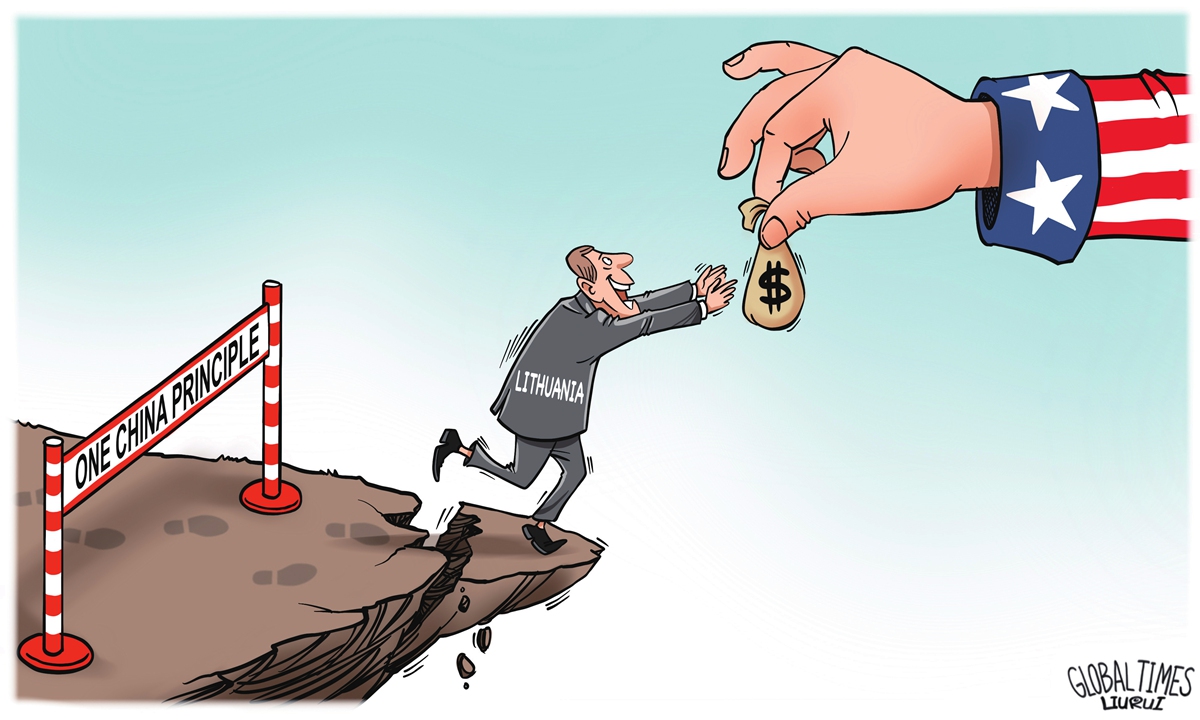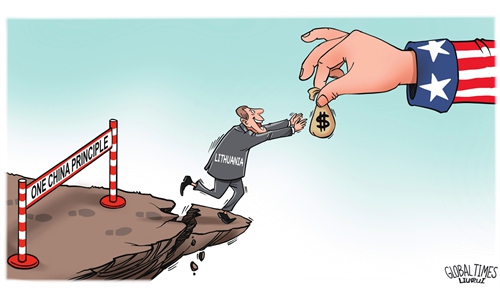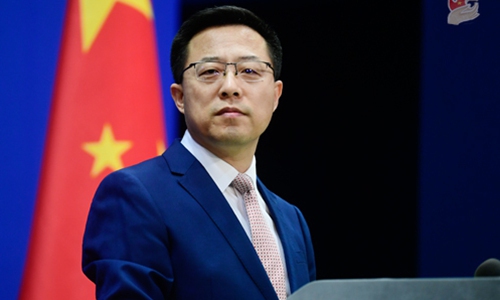
Gambling on crumbs from the US' table Illustration: Liu Rui/GT
Lithuania and the disdainful secessionists of Hong Kong and Taiwan are the same failed and foolish type. By confronting China with a narrow mind, they seek petty gains in the short run. Catering to Western major powers, Lithuania has not only provoked China on the Taiwan question to violate China's interests, but even treated an infamous Hong Kong secessionist with courtesy.Nathan Law Kwun Chung, a Hong Kong secessionist and fugitive wanted by the Hong Kong police, said on Facebook on Monday that he visited Lithuania on the day. He met Lithuanian foreign minister Gabrielius Landsbergis, and also had an "in-depth conversation" with Marius Matijošaitis, head of Lithuania's so-called Parliamentary Group for Relations with Hong Kong, as well as Dovilė Šakalienė, a Lithuanian member of parliament who has been sanctioned by China for her position on Xinjiang-related affairs. Nathan Law also said that deputy foreign minister Mantas Adomenas took him to a tour around the country's capital Vilnius.
Some Chinese netizens said that these Lithuanian officials and Nathan Law are "in league with each other." "These pro-secessionism forces in Hong Kong and Taiwan are trying to gather overseas. Under the current general trend, very few countries would want to accept them. Lithuania, this anti-China vanguard, has become one of their choices. This is a very clumsy political act," Li Xiaobing, an expert on Hong Kong, Macao and Taiwan affairs from Nankai University, told the Global Times.
What these Lithuanian officials and secessionists of Hong Kong and Taiwan have in common is that they are all made use of as political tools to do the "dirty work" for some major powers. They collude with each other and embolden each other as well.
Nathan Law and other absconding Hong Kong secessionists have violated the national security law for Hong Kong. Although they have fled overseas, their days are numbered. As for the island of Taiwan, it will never become a "country" recognized by the international community. Although some Western countries have made tricks on the Taiwan question, they dare not publicly violate the universally adopted one-China principle. Only Lithuania is seriously making contact with these secessionists who are destined to be eliminated by the general trend of the times. This is a dwarfing of Lithuania's own status.
Lithuania has clearly and mistakenly overestimated its abilities. Some Western countries had tried to make use of Hong Kong's earlier chaotic situation to mess up China, but they failed in the end. Is a tiny country like Lithuania now trying to act as a vanguard to provoke the sensitive Hong Kong and Taiwan questions, and play politics among major countries? This is wishful thinking, as Lithuania will never be able to affect the historical trend of China's national reunification, and Lithuania's actions will only squeeze the room for its own strategic options.
Lithuania hardly has any national power at all. But instead of following the general trend of international relations, it has chosen to collude with the pro-secessionism forces in Hong Kong and Taiwan, walking further away from the right track of diplomacy. Lithuania has offended both China and Russia, curried favor with the US, and eroded the foundation of the one-China principle in China-EU relations. It is surprising that a sovereign country such as Lithuania is behaving like Nathan Law and his likes, trying to gain short-term interests by provoking China. But in the long run, Lithuania will face serious geopolitical shocks.
"Lithuania will lose more opportunities and prospects for future cooperation [with China]. In the UN, the G20 and other important multilateral platforms, it is hard for Lithuania to expect its own interests and demands to be supported by China," Cui Hongjian, director of the department of European studies under the China Institute of International Studies, told the Global Times.
It will not be too long before Lithuania realizes that such collusion only makes itself a victim of competition among major powers. This harms Lithuania's own interests, and also affects regional peace in the long run. If Lithuania lacks self-awareness and goes too far, is it prepared to pay the heavy price?


